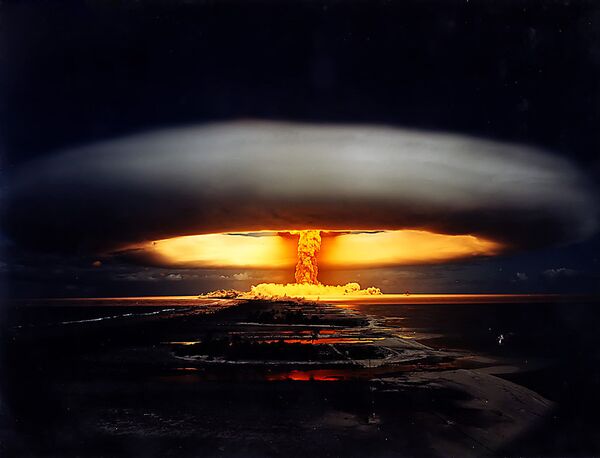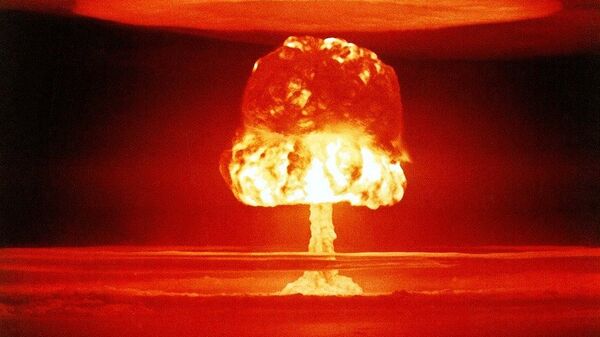Mururoa and Fangataufa atolls in the South Pacific saw 196 nuclear tests over three decades until President Jacques Chirac finally ended the programme in the 1990s.
The French also conducted nuclear tests in the Sahara Desert.
A French Polynesian opposition leader, Oscar Temaru, filed a complaint at the International Criminal Court (ICC) in The Hague on October 10 claiming France had carried out crimes against humanity, in the form of local islanders.
Alexandre Dayant, a research fellow at the Lowy Institute in Australia, said the French carried out the tests between 1966 and 1996, first in the atmosphere and then in the sub-soil.
French Polynesians Have Paid Heavy Toll For Tests
Mr. Dayant said thousands of inhabitants have paid a heavy toll through birth deficits, congenital malformations and infirmities.
"The testing programme and its intentions were kept secret, and little information was provided about the possible effects of radiation to the people who worked there. For decades, France argued that the controlled explosions were clean," Mr. Dayant told Sputnik.

"In the absence of an exhaustive epidemiological study, it was very difficult to estimate the number of potentially affected people at the time. Throughout the period of the Sahara and Polynesia trials, approximately 150,000 site workers (military contingent, contingent, civilian workers) and a local population of 80,000 were potentially exposed to doses of radioactivity," Mr. Dayant told Sputnik.
French Polynesia, an overseas territory with a population of 290,000, is best known for the tourist resort island of Tahiti, 300 miles west of Mururoa and Fangataufa.
"This case aims to hold all the living French presidents accountable for the nuclear tests against our country," Mr. Temaru said when he filed the complaint.
The Armaments Observatory published a study showing "the explosions have weakened the seabed and the soil is contaminated sustainably because of the fallout and the presence of toxic and radioactive debris (heavy metals and plutonium)" which threaten the population and the environment.
"Despite the mounting evidence, the French government denied all suggestion that the nuclear tests were harmful to health until 2010, when it introduced the Morin Law, a programme to give compensation to victims of radiation exposure. Nevertheless, the number of compensation cases accepted between 2010 and 2017 scandalized victims' associations — only 13 out of more than a thousand filed. The main reason came from the fact that it was still difficult for victims to prove the link between their disease and the tests," Mr. Dayant told Sputnik.
Call For French Polynesia to Become Independent
He said Mr. Temaru was a separatist who wanted the islands to eventually become independent like nearby Fiji and Kiribati.
French Polynesia's pro-independence opposition Tavini Huiraatira party says its leader Oscar Temaru won't lose office over alleged breaches of the electoral law. https://t.co/HQzPmCRMpT
— Gabrielle Verdier (@GabyVerdier) 18 October 2018
Mr. Temaru claimed the Polynesians had sought a "responsible dialogue" with France since 2013 but their pleas had been "ignored and despised".
"Fifty years after the first nuclear test on Mururoa, French Polynesians are still fighting for recognition of the effects of nuclear testing. This is why this claim, in front of the ICC, can help to put events back on the agenda," Mr. Dayant told Sputnik.
Meeting festif du FLNKS à Ponerihouen. Présence d’Oscar Temaru (élu assemblée de Polynésie) et François Benedeti (élu Corsica Liberta).@ncla1ere pic.twitter.com/SstKSlh293
— David Sigal (@SigalDavid) 20 October 2018
"I don't think Polynesians believe their claim will be heard. For the pro-independence party in French Polynesia, making this claim is more of a useful way to put events back on the political agenda, and on the international scene," said Mr. Dayant who pointed out that when the ICC was set up it made it clear it would not prosecute crimes committed before July 2002.
Will other countries face similar claims at the ICC?
"It is a difficult question to answer to, due to the different geopolitical relationships that other Pacific Islands countries have with the US, UK and Russia. However, if successful, this particular legal procedure can be used as a precedent for future international claims," Mr. Dayant told Sputnik.
The views and opinions expressed in this article are those of the speaker and do not necessarily reflect Sputnik's position.



